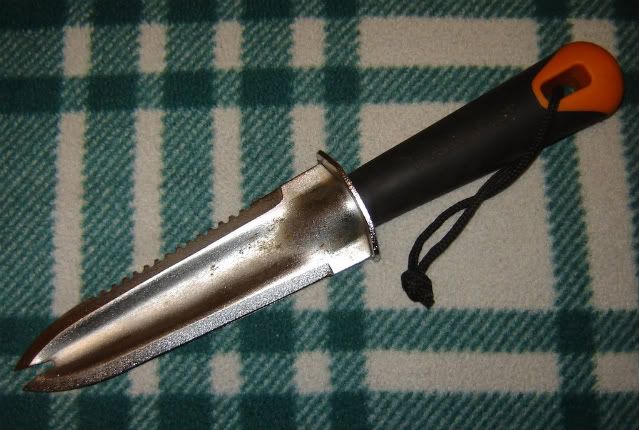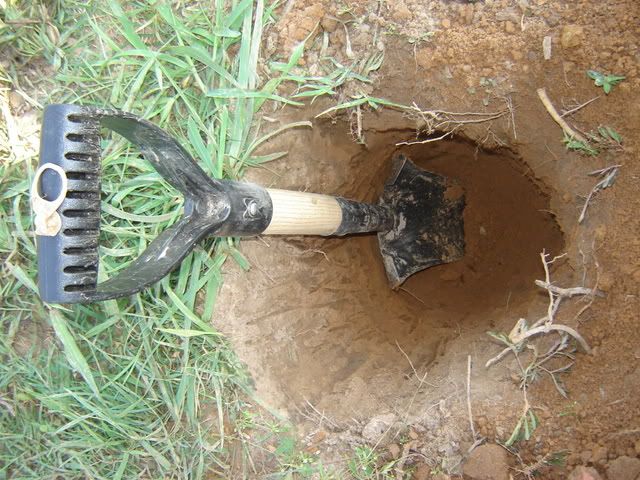I always like to post the following for newbies. There is so much more to know than just the detector you choose. That is important, but there are many good ones, each maker trying to provide the best money can buy.
With the 300-400 dollars you have, I'd look to a used Vaquero if you like simple, or one of the Whites Prism series if you like a feature laden instrument. Don't shun the Garrett GTP 1350, either, although this is another you'll have to get used with your budget. Also consider the Fisher 1236-X - a very good detector and has been for many years.
Wthout further ado, here are my:
[size=medium]"Secret Tips to Success...for Metal Detecting Newcomers"[/size]
1. Equipment is NOT the answer.
There I said it. More important, more crucial, is MINDSET. We tend to be techno-dependent, expecting our expensive gadgets to do all things for us. But, guess what? People were finding treasures before detectors came along. The difference is they knew what to look for and had some idea where to find it. You do the same. Consider Mel Fisher, and try to follow his "Today's the Day!" outlook. Do buy a quality detector, then think of it as a means to an end. As I like to say, "Know Before You Go."
2. Dig, man dig!
You wont find anything if you don't, and you won't learn what your machine is telling you. Your goal is to become an object recovery specialist, not an object locating expert.
3. DO NOT rely on meters or displays.
There is a mountain of hype that claims this detector or that detector can tell "trash from treasure." DO NOT believe it. There is A LOT of junk out there and most of it masquerades as good stuff. You will find trash and plenty of it, so start developing a cavalier attitude to it early on. Test your detector ON CLEAN GROUND with these things:
Coins - Quarters, dimes, cents nickels
Jewelry - Rings, pendants pins, etc.
Pulltabs - both the square type (those intended to stay on the can) and the older ring-and-tab type.
Make little test plot somewhere in your yard and bury one each of these things, about a foot apart. Use this plot to get to know your detector. Air tests are nice, but are essentially meaningless when you get out in the real world.
When in doubt, see TIP #2 .
4. Turn the Sensitivity down to start.
Dont expect to find stuff halfway to China, as most good things are within the first FOOT, usually less. 60% or so will do.
That's the good news.
Here's the bad: SENSITIVITY (gain) increases cannot "suck in" what isn't there to start with. Rather, gain that is set too high only results in false signals and lots of frustration.
5. Set time limits.
a. Plan to detect for a certain amount of time, as often as possible. Like any activity, good practice makes you better.
b. DO NOT detect longer that you should - set a limit on that, too. Remember you have a job, a family and friends.
6. Set Recovery Goals.
A certain coin, or artifact, a certain number of coins, etc. Then work to achieve them.
Some say that this is "just a hobby - and goals are for work." DO NOT repeat that slackers motto, either. Achievement/success is utterly dependent on your ability to push yourself beyond the mundane, past the easy frontiers. Without goals, you will be far less inclined to do so.
7. Carry your detector with you as much as possible.
You never know when a chance to detect will come along. Keep an eye out for earth moving equipment and construction when you go about your business. Having your detector at the right moment could be a real benefit. But don't leave it in your car, longterm! Take it out when you get home.
We're talking about sensitive, costly electronic instruments here.The heat and jostling is murder on them - and thieves know what they are worth, too.
8. Learn about your area and what you might actually find.
Do a little research about every possible place you might consider detecting, from the local park and school to vacant lots in town. Many places and areas in most towns have had more than one life. Do a little digging to ferret out what might have gone on before. Visit the library and Historical Society in your area. Find the old maps.
Here's an example. The main park in my city was once an old home place, then a parking area for a race track, then a housing area through the 50's and now it's a modern park. The old coins and stuff are NOT where the modern play grounds are - and few know it but me, thanks to my research of this one small area. While the others are banging away in the wood chips, I've uncovered older goodies going back to the 30's. See what I mean?
9. Talk to your friends and family about your new hobby.
Include the strangers you meet too, like folks in the checkout line or bank tellers. Ask if they know any old places, or good modern places, where lots of people have been active. Ask about old home sites and make it a point to speak with oldtimers about such things. Make up some simple personal introduction cards on your computer, naming you as "Detectorist." People respect credentials and being an ambassador of the hobby will open doors for you.
However, avoid the term "treasure hunter." This gives all the wrong ideas to people.
10. Plan to do all sorts of detecting.
You are new and this hobby has lots to offer. Dont imagine yourself only "this sort" of detectorist or "that sort." Try it all.
11. Learn the Detectorists Code of Ethics.
And practice good recovery techniques, ALL THE TIME. Few things will sour you on this hobby like being ticketed for leaving holes behind you or getting busted on private property. I learned this last one the hard way, at the wrong end of a shotgun - don't repeat my mistake.
12. Get a durable carry bag and keep these things in it:
+ Extra headphones - A broken set of phones will ruin any hunt.
+ Extra batteries for your unit(s)- Likewise, a set of dead batteries is a fun-buster.
+ 2 Digging Trowels - NOT the crap from WalMart's garden section. Get purpose built tools.
+ An inexpensive sand scoop. There are an amazing number of easy-digging, sandy spots to hunt. You'll thank me for suggesting this one.
+ 1 recovery apron - Most home centers sell nail aprons for $1. They''ll do nicely.
+ 1 10" probe - I make mine from a 3/16" piece of brazing rod and a section of old broom handle. Use this to probe for coins beneath the turf.
+ 1 10" long screwdriver - for "popping" the coins you probe from the turf.
+ 1 8-10" inch hunting knife - Just plain useful. Cuts roots, plugs in grass, etc.
+ Garden gloves - ones you can manage dextrous work in.
+ Super glue and duct tape - you don't need this explained, right?
...You can have more but you'll need these things, sooner or later.
BONUS TIP #13: Determine to Have Fun!
[size=x-small]copyright 2008, ddh. All rights reserved. Do not reprint without permission.[/size]



 I guess from what you said you want a display. If not having one is OK, there just is not a better detector around for near the price than the Tesoro Compadre at about $150 (with a lifetime guarantee) for the beginner or old veteran like myself. It is sensitive, light, accurate Quality detector. I have used just about everything and there is a place for high dollar detectors, but just for using and enjoying the sport the Compadre is just hard to beat. It is cheap to run and is deep enough for most hunting. I have hunted with one that belonged to a contact of mine, but Just did get one of my own (Ijust could not stand it any longer). That little 5 3/4 inch coil is fantastic coil.
I guess from what you said you want a display. If not having one is OK, there just is not a better detector around for near the price than the Tesoro Compadre at about $150 (with a lifetime guarantee) for the beginner or old veteran like myself. It is sensitive, light, accurate Quality detector. I have used just about everything and there is a place for high dollar detectors, but just for using and enjoying the sport the Compadre is just hard to beat. It is cheap to run and is deep enough for most hunting. I have hunted with one that belonged to a contact of mine, but Just did get one of my own (Ijust could not stand it any longer). That little 5 3/4 inch coil is fantastic coil.  Compadre, Silver Umax, Inca, Bandido Umax, Vaquero, Whites Classic II, Minelab, Tinytec and a Bounty Hunter (at this Time). Gosh I have to get rid of a few, But I like using them all. Bill in Texas
Compadre, Silver Umax, Inca, Bandido Umax, Vaquero, Whites Classic II, Minelab, Tinytec and a Bounty Hunter (at this Time). Gosh I have to get rid of a few, But I like using them all. Bill in Texas


